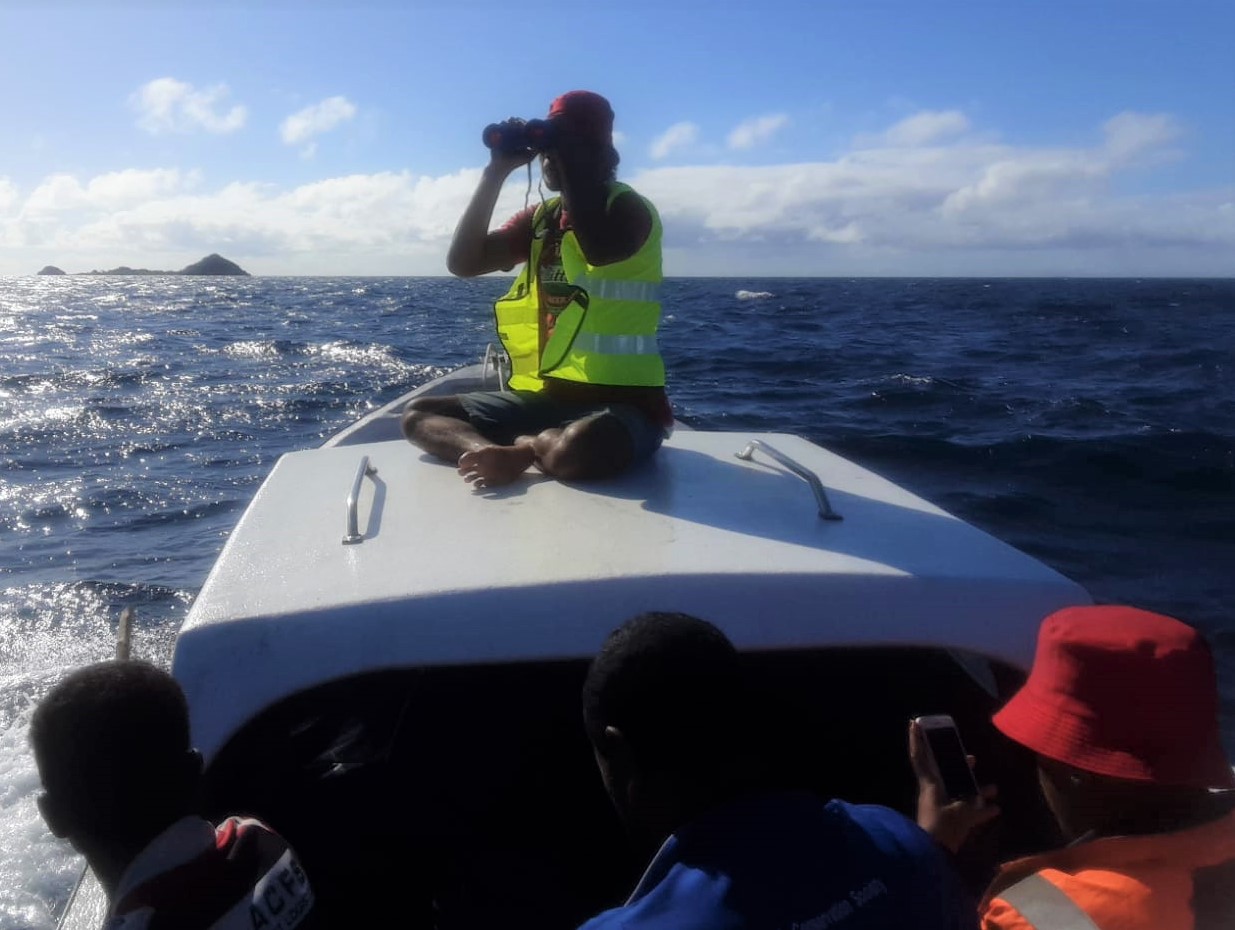The coastal communities of the Nakorotubu District in Ra Province now have ten fish wardens and a patrol boat to help monitor and safeguard Fiji’s largest conservation park, established as a partnership between local communities and tourism operators.
Protected within the Conservation Park, Vatu Island is home to a multitude of breeding seabirds, and its surrounding waters support a rich biodiversity of marine life including one of the most flourishing reef systems world-renowned for diving.
To implement the management plan that prohibits fishing in no-take zones, or limits certain activities such as accessing the island without consent of the landowning community, the Wildlife Conservation Society (WCS), International Union for Conservation of Nature (IUCN) and the Vatu-i-Ra Conservation Park Board of Trustees have supported fish warden training and handed over a patrol boat to the Management Committee that will coordinate and implement the monitoring and surveillance of the Conservation Park.
WCS Fiji Country Director, Paul van Nimwegen, said that strengthened surveillance efforts will help the community to monitor the management rules outlined in the plan.
“The fish wardens, equipped with a patrol boat, will help protect customary fishing grounds that the communities rely on for food security and income generated through tourism operations,” he said.
The Chair for the Vatu-i-Ra Conservation Park Management Committee, Emori Latibau said having fish wardens patrol the conservation park would be a deterrent for poachers as well.

“The provision of a boat and equipment will help our fish wardens patrol the area in close coordination with the Ministry Fisheries, provide much needed awareness to local fishers, and help reduce illegal fishing in the Park,” he said.
“The presence of fish wardens will also help monitor any unauthorised entry to the island without consent and biosecurity clearance,” he added.
“The Man agement Committee and the people of Nakorotubu District are grateful to WCS and IUCN for their continued support to help us keep our commitment towards protecting and managing our resources, and protecting the remarkable biodiversity of both our marine and terrestrial ecosystems to preserve our cultural history,” said Latibau.
agement Committee and the people of Nakorotubu District are grateful to WCS and IUCN for their continued support to help us keep our commitment towards protecting and managing our resources, and protecting the remarkable biodiversity of both our marine and terrestrial ecosystems to preserve our cultural history,” said Latibau.
“By empowering local communities through providing monitoring equipment, training and awareness raising, we hope to contribute towards improving the long term conservation and protection of Vatu-i-Ra’s biodiversity and natural resources for the people of Nakorotubu District, and an area of national priority,” said Mason Smith, Regional Director of IUCN Oceania.
The fish warden training was condu cted by the Ministry of Fisheries and included awareness on the Fisheries Management Act, and emphasised the critical role fish wardens play in managing sustainable fisheries.
cted by the Ministry of Fisheries and included awareness on the Fisheries Management Act, and emphasised the critical role fish wardens play in managing sustainable fisheries.
The fish warden training was facilitated by WCS and IUCN with support from the Blue Action Fund and by the European Union and the Organisation of African, Caribbean and Pacific States through the Biodiversity and Protected Areas Management (BIOPAMA) Programme.
-ENDS-
About Blue Action Fund
Blue Action Fund is a foundation for the protection of oceans and coasts. It funds projects that contribute to the United Nations Sustainable Development Goal 14, as well as to the Aichi Biodiversity Target 11 for global biodiversity conservation. Blue Action Fund recognises the ocean’s fundamental role in ensuring the health of our planet and the wellbeing of mankind. Our vision is of a carefully managed and sustainably used ocean full of abundant, healthy marine life providing major benefits to people and the environment. Our mission is to enhance the management and use of coastal and marine ecosystems to conserve marine biodiversity for future generations while improving the lives of local people today. We pursue that mission by making targeted grants to non-governmental organisations active in developing countries. https://www.blueactionfund.org/
About BIOPAMA
The Biodiversity and Protected Areas Management (BIOPAMA) programme aims to improve the long-term conservation and sustainable use of natural resources in African, Caribbean and Pacific (ACP) countries, in protected areas and surrounding communities. It is an initiative of the Organisation of African, Caribbean and Pacific States financed by the European Union’s 11th European Development Fund (EDF), jointly implemented by the International Union for Conservation of Nature (IUCN) and the Joint Research Centre of the European Commission (JRC). Building on the first five years of activities financed by the 10th EDF (2012-2017), BIOPAMA’s second phase provides tools for data and information management, services for improving the knowledge and capacity for protected area planning and decision making, and funding opportunities for specific site-based actions. www.biopama.org
Photos: © WSC Fiji
]